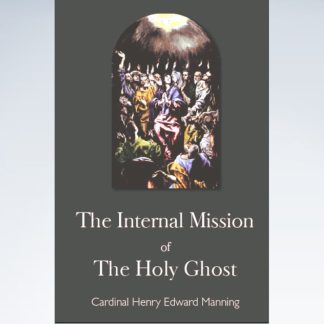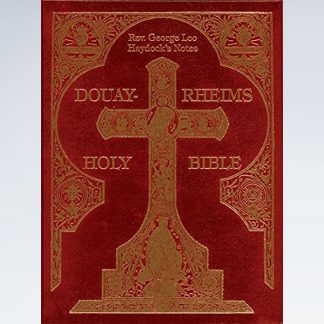

THE CATHOLIC PENTECOSTAL MOVEMENT
The following letter and response come from the New Covenant, a monthly magazine which caters to those active in the Catholic and Protestant Pentecostal or Charismatic movements.
“Q: Someone recently attended our prayer meeting and spoke out as a prophecy a word glorifying Satan. He could not be quieted and most of the people attending the meeting were quite upset. What can we do when this type of situation arises?”
“A: It seems that some kind of evil spirit was attempting to disrupt the prayer meeting. Many prayer groups have had similar occurrences. The group’s leaders should do everything possible to comfort and reassure the other members of the group. One of the leaders should publicly explain what has happened and encourage the people not to be fearful or upset. It is especially important if there are newcomers in the group to let them know that these occurrences are not the norm.”
When the disciples asked Jesus how to pray, He taught them the Our Father. Simple. Not an emotional, energy-packed experience. Not a “gift” which some people receive, while others do not (i.e. praying in “tongues”), but rather a simple prayer which any man, woman or child can say.
The lives of the Saints clearly reinforce this truth. Their methods of prayer did not resemble sporadic outbreaks in unknown, indecipherable tongues. They became Saints on the traditional prayers of the Church: the Creed, the Our Father, the Hail Mary, the Glory Be, etc., and of course the constant raising of their hearts in gratitude to God. How many countless Saints have exalted the Rosary? One never hears of satanic occurrences described in the letter above happening in rosary prayer groups.
The Pentecostal Church began in Topeka, Kansas, in 1900. It is a Protestant movement which has splintered into at least 16 different groups because of dissension and disagreement on how to interpret the Bible. This movement is nothing more than the work of the Evil One.
Some of the more outstanding difficulties with “Catholic” Pentecostalism are as follows:
1. The Charismatic movement magnifies the Holy Spirit. The Bible magnifies Christ. John 16:13-14: “But when he, the Spirit of truth, is come, he will teach you all truth. For he shall not speak of himself; but what things soever he shall hear, he shall speak; and the things are to come, he shall show you. He shall glorify me, because he shall receive of mine and shall show it to you.”
2. The Charismatic movement says that speaking in tongues is a sign that you have been baptized with the Holy Spirit. The Bible says that it was a sign to unbelieving Jews. I Cor. 14:22: “Wherefore tongues are for a sign, not to believers, but to unbelievers, but prophecies not to unbelievers, but to believers.”
3. The Charismatic movement says that it is all right for women to speak in tongues in the church. The Bible says that women are to keep silent in the church. I Cor. 14:34: “Let women keep silence in the churches: for it is not permitted them to speak, but to be subject, as also the law saith.”
4. The Charismatic movement places great emphasis on “bodily healing” and tells people that “God is not wanting anybody to be sick”, but they have not Scripture to show us where God ever said that. Many of them scoff and sneer at such passages. II Cor. 12:7-9: “And lest the greatness of the revelations should exalt me, there was given me a sting of my flesh, an angel of Satan, to buffet me. For which thrice I besought the Lord, that it might depart from me. And He said to me: ‘My grace is sufficient for thee; for power is made perfect in infirmities, that the power of Christ might dwell in me.'”
5. The entire movement is founded on a sin against Faith.
There are three ex-cathedra dogmatic pronouncements (infallibly revealed truths through God that can never be changed or revoked) teaching that outside the Catholic Church there is no salvation. The most striking of those pronouncements reads:
The most Holy Roman Church firmly believes, professes and preaches that none of those existing outside the Catholic Church, not only pagans, but also Jews and heretics and schismatics, can have a share in life eternal; but that they will go into the eternal fire which was prepared for the devil and his angels, unless before death they are joined with Her; and that so important is the unity of this ecclesiastical body that only those remaining within this unity can profit by the sacraments of the Church unto salvation, and they alone can receive an eternal recompense for their fasts, their almsgivings, their other works of Christian piety and the duties of a Christian soldier. No one, let his almsgiving be as great as it may, no one, even if he pour out his blood for the Name of Christ, can be saved, unless he remain within the bosom and the unity of the Catholic Church. (Pope Eugene IV, the Bull Cantate Domino, 1441.)
In perfect continuity with these infallible teachings, traditional Catholic Moral theology, here summarized by Bishop Louis LaRavoire Morrow, S.T.D., holds that “A Catholic sins against Faith by taking part in non-Catholic worship, because he thus professes belief in a religion he knows to be false.”
Yet by the admission of Catholic Charismatic pioneer, Kevin Ranaghan, the movement began with Catholics performing the grotesque ritual of seeking a spiritual blood transfusion from the dead corpse of Protestantism, and proclaiming that God “filled them to overflowing with the spirit” for doing so. Such collaborating and “seeking the holiness of the Holy Spirit” from anathematized heretics cannot be a religious movement truly of God.
Pope Pius XI further castigated interfaith projects in his Encyclical Mortalium Animos on fostering true religious unity, stating, “…It is clear why this Apostolic See has never allowed its subjects to take part in the assemblies of non-Catholics. There is only one way in which the unity of Christians may be fostered, and that is by furthering their return to the one true Church of Christ for those who are separated from Her.”
What has been the result of the Protestant revolt which began in the 16th century?
An article in the U.S. News & World Report of March 1991 stated that as of 1985, the number of denominations surpassed 22,000 with an average of five new ones being organized each week. The Baptists, founded in 1600, have 27 or more different groups; the Lutherans, founded in 1517, have 20 or more groups; the Methodists, founded in 1739, have at least 19 divisions; the Christian Church established in 1809 has split into three groups.
Why are there so many different Protestant sects which claim to be founded on the Bible and the Bible alone?
Let us listen to St. Alphonsus Mary Liguori: “Innovators say that the Lord gives each of the faithful a clear knowledge of Scripture. Behold, the ‘private interpretation’ of the heretics which has produced such a variety of creeds! Hence, after all the Congresses and Synods they have held, they have never been able to draw up a formula of uniform belief; hence, everyone knows that among the Reformers there are as many formulas of faith as there are individuals. This alone is sufficient to show that they are in error and do not have the true faith. God arranged that the true faith would be preserved in the Roman Church alone, so that, there being but one Church, there would be but one faith and one doctrine for all the faithful.”
Even Martin Luther, the originator of Protestantism and instigator of the idea of private interpretation of the Bible, admitted that: “There are almost as many sects and beliefs as there are heads.”
If one wants to acquire a great love and enthusiasm for the Catholic Faith and a knowledge of how to live a good Christian life, then he ought to read the lives of the saints. After Sacred Scripture and what may be described as normal teaching of the Church, probably nothing has been more conducive to the promotion of holiness throughout the ages than the recorded memorials of the saints. One of the greatest proofs that the Catholic Church is the one true Church founded by Our Lord and Savior, Jesus Christ, is the great saints and holy persons that He has raised up in His Church in every century since Our Lord was here on earth. The gift of miracles has never ceased to show its presence in the Catholic Church. Let us consider a few of the saints that Almighty God has given this gift of working tremendous miracles.
First and foremost is His Blessed Mother. Consider the great miracle of Lourdes where Our Lady appeared to St. Bernadette in 1858. Thousands of miraculous cures have occurred there for over a century. Hollywood even made a movie of this great event called The Song of Bernadette. The great public miracle of Fatima in 1917, witnessed by over 70,000 people, is another tremendous testimony to Our Blessed Mother’s great intercessory power with her Divine Son. But even more important than the healing miracles of the body, are the great conversions that have happened at these shrines of Our Lady.
In 20th century we have Padre Pio, a Capuchin Monk, who had the stigmata of Christ’s wounds for 50 years before his death in 1968. He was known far and wide for the many tremendous miracles that God worked through him during most all of his long life of 81 years.
Blessed Andre, a humble brother from Montreal, Canada, was another great miracle worker in this century. St. John Vianney, St. Anthony Mary Claret and St. John Bosco are three of the great miracle workers of the 19th century. St. Paul of the Cross, St. Alphonsus Mary Liguori and St. Leonard of Port Maurice of the 18th century; St. Joseph of Cupertino, St. Peter Claver and St. Martin de Porres in the 17th century; St. Francis Xavier, St. Theresa of Avila and St. Louis Bertrand of the 16th century; St. Vincent Ferrer, who lived in the 14th and 15th century worked some 40,000 miracles including the raising of at least 28 persons from the dead and converting some 200,000 souls to the one true Church, including 25,000 Jews and 8,000 Moors. St. Patrick worked tremendous miracles in converting all of Ireland from a pagan nation to a Catholic country. He raised over 30 people from the dead – many of whom had been dead for years. St. Francis Xavier, as a missionary to the Indies, converted over a million people to the Catholic Faith. Almighty God confirmed his work by the many miracles He wrought through him, including many resurrection miracles.
The working of miracles is proof as we know from the very texts of the Gospel which promises that power to the saints – both of the sanctity of the worker and of the truth of the doctrines which he promotes. “If you will not believe Me”, said Our Lord to the Jews, “believe the works that I do.” (John 10:38)
The lives of all of these saints are readily available to all who want to read and be edified by them, but sad to say, most Catholics are not familiar with them due to negligence.
For those outside of the Catholic Church, let this article be an eye-opener for you to investigate the doctrinal teaching of the Roman Catholic Church that “outside of the Catholic Church, there is no salvation“. So many souls are lost because of ignorance. God wants all men to be saved. He tells us so in the Holy Bible, that He enlightens every man that cometh into the world. He provides us with all the means most proper for us to be saved. Ignorance of the means of salvation is sinful because it is due to slothful negligence. “And they did not understand until the flood came and swept them away.” (Matt. 24:39)
Our Lady of the Rosary Library
STILL PROMULGATING RENEWAL?
“I gave you My human life upon earth, and what have you done?
You crucify Me again in My own House, My Church!
You crucify those who stand in righteousness in My Church and cast them out, as you rebuild My Church.
For what? A renewal?
And what are you renewing?
What is your renewal?
What are you renewing?
Have you found fault with My way?
Shall you create a new way of man?
I say unto you, you blaspheme!
You have cast yourself out of the light into the darkness, O pastors.”
[From private revelations]

VIRGÓ SACRÁTA is a Christian mission-driven online resource and shop inspired from the beauty of Catholic faith, tradition, and arts. Our mission is to “Restore All Things to Christ!”, in continuing the legacy of Pope St. Pius X under the patronage of the Blessed Virgin Mary. “Who is she that cometh forth as the morning rising, fair as the moon, bright as the sun, terrible as an army set in battle array?” O Mary, conceived without sin, pray for us who have recourse to Thee.





